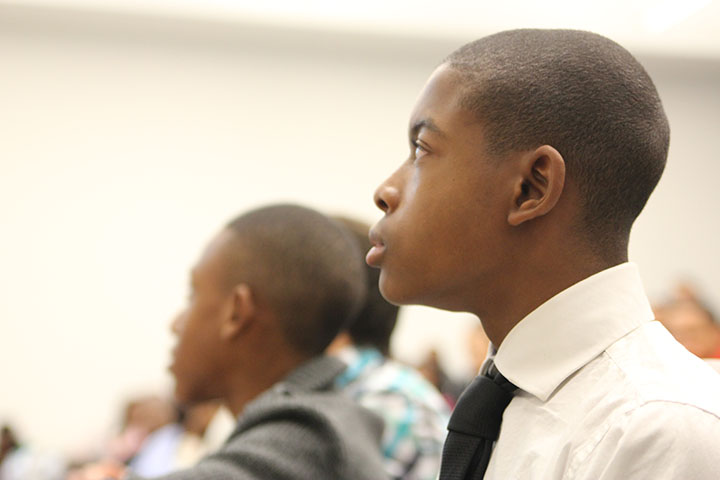[imagebrowser id=25]
[fresh_divider style=”solid”]
Fourteen-year-old William Gilmore sat in absolute silence surrounded by the sounds of nervous laughter and the light chatter of other seated high school boys.
Gilmore was the youngest of seven local teenagers who competed in the Martin Luther King, Jr. High School Male Oratorical Competition, a speech contest scholarship hosted by Alpha Phi Alpha Fraternity and the Butler Center for Service and Leadership in the Senate room of the SAC Wednesday.
The competition commemorates distinguished civil rights activist Martin Luther King, Jr., who is commonly noted in history for his 1963 “I Have a Dream” speech during the March on Washington.
“When a lot of people talk about Martin Luther King, they try to focus on his less controversial statements, the stuff that makes people feel good,” said Mischael Cetoute, Alpha Phi Alpha Fraternity president. “They fail to acknowledge the condemnation for inequality in general.”
Beyond his action for disenfranchised blacks in the 50s and 60s, King was a huge advocate for the working class. His late life was dedicated to a growing dream of alleviating poverty to welcome in an age of economic equality.
Robert Moore, director of the Office of Academic Enhancement, was one of five judges for the event. He said the oratorical contest helps celebrate King’s legacy for a key demographic.
“I think it’s of the upmost importance because of all the work Dr. King did for equality, social justice and life, but to keep the dream alive with younger people,” he said.
Cetoute said the topic of the oratorical, drawn from a memorable Lebron James’ 2013 championship speech, capitalizes the King’s message of economic empowerment by challenging the contestants to articulate ideas about privilege, disparity and overcoming the odds.
To the nation watching and fans at the American Airlines Arena, James shared that he was an inner-city kid and “not even supposed to be here,” a statement that created tremendous backlash from critics who didn’t consider statistics about “at-risk” minority male youth.
Reports from government agencies show that black males experience the lowest survival rates and life expectancy of all racial-gender groups.
All seven of the contest contestants were minority students, representing high schools all over South Florida. High school junior Alinord Mezinord spoke about the daily realities of inner-city children, a category he just recently discovered is being blindly applied to describe him.
“I think the narrative is so limited,” Cetoute said. “It’s a disservice to black men to put them in these boxes that they feel like they cannot escape. This oratorical is just one way we allow people to escape the box that they’ve been confined to by society.”
High school Gilmore sat resolutely until he was called to the podium.
“It’s a lot of pressure to keep up with the older kids,” said Gilmore, who spent his early life growing up in his father’s home in Liberty City, a community plagued with despair and characterized by poverty and violence. He said he related to James’ story and prepared for his recitation the whole day.
Gilmore rose to speak to the room. He didn’t mention King, like other kids, but described a dream of his own – one where he woke up to his mother’s car being repossessed. Except it wasn’t a dream.
“I didn’t have water or electricity some days. My car was taken away,” he said. “I didn’t like it too much.”
Still, Gilmore and all the contestants spoke with hope for the future – a hope backed more importantly by hard work and determination.
The winner of the competition was high school senior Matthew Escobar who spoke eloquently about recognizing success as attainable no matter the circumstances. He was awarded the $500 scholarship.







